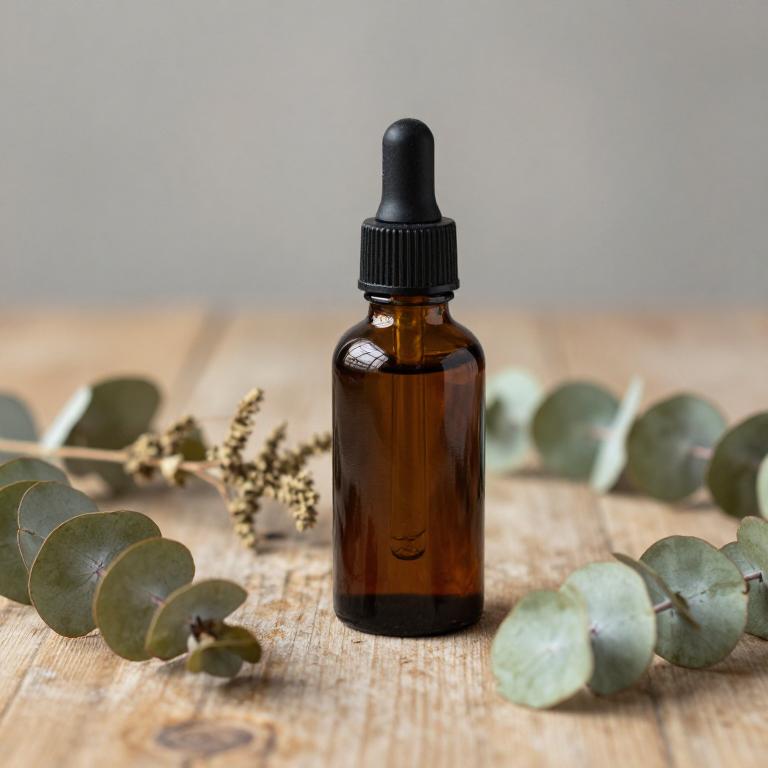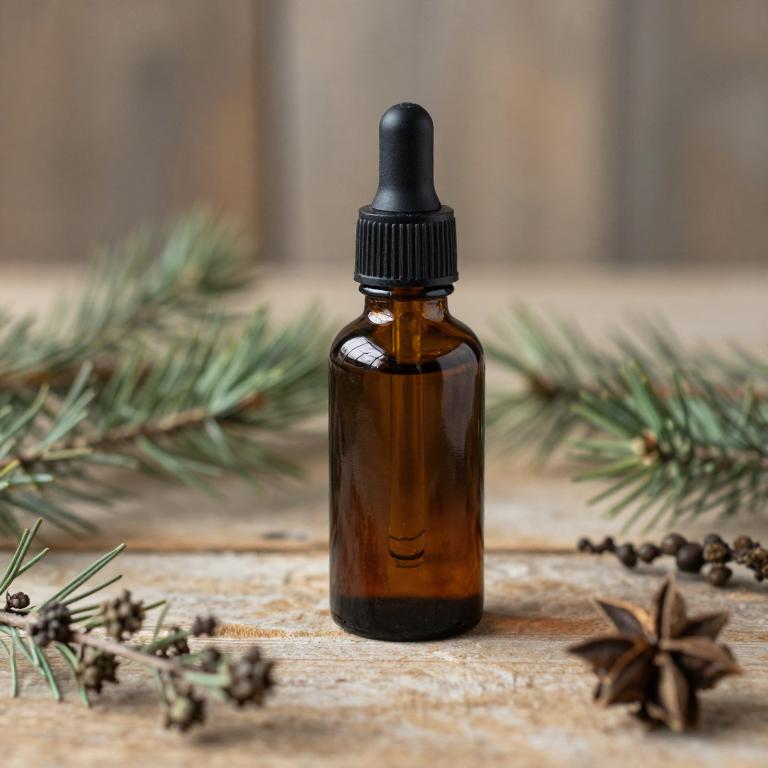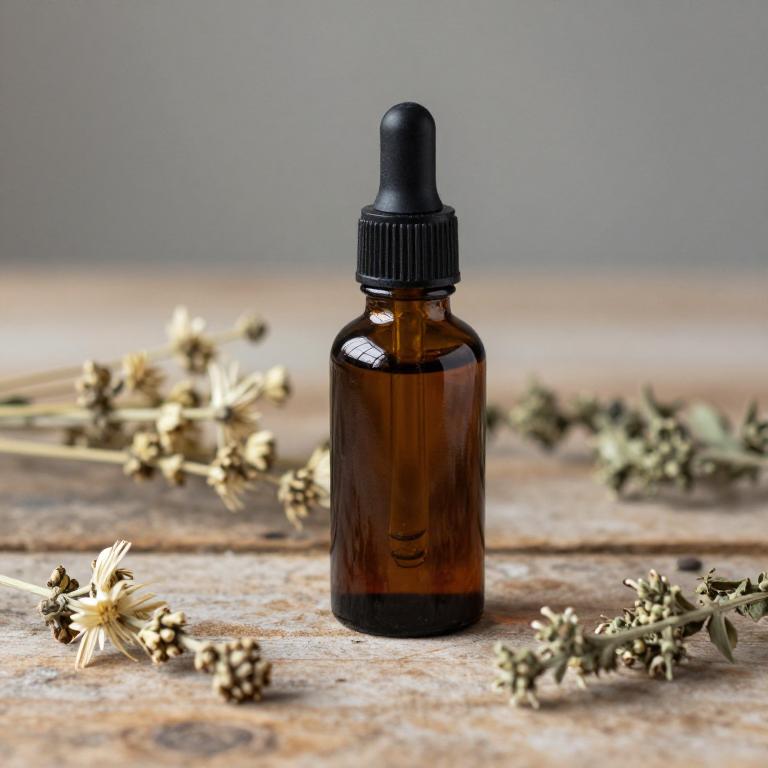10 Best Herbal Tinctures For Blocked Nose

Herbal tinctures can be an effective natural remedy for alleviating symptoms of a blocked nose by utilizing the anti-inflammatory and decongestant properties of various herbs.
Common ingredients in these tinctures include eucalyptus, ginger, garlic, and sage, which have been traditionally used to reduce nasal congestion and promote clear breathing. These tinctures are typically made by soaking dried herbs in alcohol or glycerin, allowing the active compounds to be extracted for easy absorption. When used consistently, they may help reduce inflammation in the nasal passages and ease respiratory discomfort.
However, it is important to consult with a healthcare provider before using herbal tinctures, especially for individuals with allergies or those taking other medications.
Table of Contents
- 1. Thyme (Thymus vulgaris)
- 2. Peppermint (Mentha piperita)
- 3. Eucalyptus (Eucalyptus globulus)
- 4. Ginger (Zingiber officinale)
- 5. Salvia (Salvia officinalis)
- 6. Rosemary (Rosmarinus officinalis)
- 7. Scots pine (Pinus sylvestris)
- 8. Catnip (Nepeta cataria)
- 9. Fennel (Foeniculum vulgare)
- 10. Stinging nettle (Urtica dioica)
1. Thyme (Thymus vulgaris)

Thymus vulgaris, commonly known as thyme, is often used in herbal tinctures to help alleviate symptoms of a blocked nose due to its antimicrobial and anti-inflammatory properties.
These tinctures typically contain essential oils extracted from the leaves and flowers of the plant, which are known to have decongestant effects. When used as a nasal spray or applied topically, thyme tinctures can help reduce mucus buildup and soothe irritated nasal passages. However, it is important to dilute the tincture properly before use to avoid irritation.
As with any herbal remedy, it is advisable to consult with a healthcare professional before incorporating thyme tinctures into your treatment regimen.
2. Peppermint (Mentha piperita)

Mentha piperita, commonly known as peppermint, is often used in herbal tinctures to alleviate symptoms of a blocked nose due to its strong decongestant properties.
The essential oils in peppermint, particularly menthol, help to reduce nasal congestion by stimulating the release of mucus and promoting clear breathing. These tinctures are typically prepared by soaking crushed peppermint leaves in alcohol, allowing the active compounds to extract into the liquid. When used as a nasal spray or applied topically, peppermint tinctures can provide rapid relief from sinus pressure and stuffiness.
However, it is important to consult a healthcare professional before use, especially for individuals with sensitive skin or underlying health conditions.
3. Eucalyptus (Eucalyptus globulus)

Eucalyptus globulus, commonly known as Australian eucalyptus, is often used in herbal tinctures to alleviate symptoms of a blocked nose due to its strong antiseptic and decongestant properties.
The tincture works by stimulating the mucous membranes in the nasal passages, helping to loosen mucus and reduce congestion. It also has a soothing effect that can ease the irritation associated with a stuffy nose. When used as a steam inhalation or diluted in water, it can provide rapid relief for nasal congestion.
However, it is important to consult with a healthcare professional before use, especially for children, pregnant women, or individuals with existing health conditions.
4. Ginger (Zingiber officinale)

Zingiber officinale, commonly known as ginger, is often used in herbal tinctures to alleviate symptoms of a blocked nose due to its anti-inflammatory and decongestant properties.
These tinctures typically contain a concentrated form of ginger extract, which can help reduce nasal congestion by promoting mucus drainage and easing respiratory discomfort. The active compounds in ginger, such as gingerol and shogaol, are believed to stimulate circulation and reduce inflammation in the nasal passages. When taken as a tincture, ginger can provide a natural and effective remedy for sinus pressure and stuffiness without the side effects of over-the-counter medications.
However, it is important to consult a healthcare professional before use, especially for individuals with existing health conditions or those taking other medications.
5. Salvia (Salvia officinalis)

Salvia officinalis, commonly known as sage, has been traditionally used in herbal medicine for its potential respiratory benefits.
Sage tinctures, made by extracting the plant’s leaves in alcohol, are believed to have anti-inflammatory and decongestant properties that may help alleviate symptoms of a blocked nose. The active compounds in sage, such as thujone and flavonoids, are thought to reduce mucus production and ease nasal congestion. While some studies suggest sage may support respiratory health, it is important to consult a healthcare professional before using it, especially for prolonged periods or in combination with other medications.
Overall, sage tinctures can be a natural complementary approach to managing nasal congestion, though they should not replace conventional medical treatments.
6. Rosemary (Rosmarinus officinalis)

Rosmarinus officinalis, commonly known as rosemary, is a versatile herb that has been traditionally used for its aromatic and therapeutic properties.
Rosemary tinctures are often used to alleviate symptoms of a blocked nose due to their ability to promote nasal decongestion and improve respiratory function. The essential oils in rosemary, such as cineole and camphor, have natural antiseptic and anti-inflammatory properties that can help reduce mucus buildup and soothe irritated nasal passages. When used as a tincture, rosemary can be applied topically or inhaled to provide quick relief from congestion.
However, it is important to consult with a healthcare professional before using rosemary tinctures, especially for individuals with allergies or sensitive respiratory systems.
7. Scots pine (Pinus sylvestris)

Pinus sylvestris, commonly known as Scots pine, has been traditionally used in herbal medicine for its potential respiratory benefits, including alleviating symptoms of a blocked nose.
The essential oils extracted from its needles contain compounds like alpha-pinene and beta-pinene, which have anti-inflammatory and decongestant properties. When used in tincture form, these oils can be diluted and applied nasally to help reduce nasal congestion and improve breathing. Herbal tinctures made from Pinus sylvestris are often prepared using alcohol as a solvent to preserve the active compounds.
However, it is important to consult with a healthcare professional before using these tinctures, especially for individuals with allergies or existing medical conditions.
8. Catnip (Nepeta cataria)

Nepeta cataria, commonly known as catnip, has been traditionally used for its calming and decongestant properties, making it a popular choice for herbal tinctures aimed at relieving blocked noses.
The essential oils in catnip, particularly nepetalactone, are believed to stimulate nasal passages and promote the flow of mucus, offering natural relief from congestion. When used as a tincture, nepeta cataria can be diluted in water or taken sublingually to harness its therapeutic effects without the risk of ingestion of the plant's leaves. This herbal remedy is often favored for its gentle and non-addictive nature, making it a safe option for those seeking alternative treatments for cold or allergy-related nasal blockage.
However, it is important to consult with a healthcare professional before using catnip tinctures, especially for individuals with pre-existing medical conditions or those taking other medications.
9. Fennel (Foeniculum vulgare)

Foeniculum vulgare, commonly known as fennel, is a herb often used in herbal tinctures to alleviate symptoms of a blocked nose.
The essential oils in fennel, particularly anethol and fenchone, have natural decongestant properties that help reduce nasal congestion. When prepared as a tincture, fennel can be taken orally or used as a nasal spray to provide relief from sinus pressure and inflammation. It is often recommended for its mild warming effect, which can help open up the airways.
However, it is important to consult with a healthcare provider before use, especially for individuals with allergies or existing medical conditions.
10. Stinging nettle (Urtica dioica)

Urtica dioica, commonly known as stinging nettle, has been traditionally used in herbal medicine for its potential anti-inflammatory and decongestant properties.
When prepared as a tincture, it may help alleviate symptoms of a blocked nose by reducing nasal swelling and mucus production. The active compounds in stinging nettle, such as histamine and flavonoids, are believed to contribute to its effectiveness in clearing nasal passages. However, it is important to consult with a healthcare professional before using urtica dioica tinctures, especially for individuals with allergies or existing medical conditions.
While some people may find relief from using this herbal remedy, its efficacy can vary, and it should not replace conventional treatments without proper guidance.